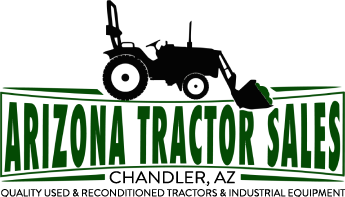How Often Should You Do Tractor Maintenance? Insights from Arizona Tractor Sales
How Often Should You Do Tractor Maintenance? Insights from Arizona Tractor Sales
Maintaining your tractor is crucial for ensuring its longevity, performance, and reliability. At Arizona Tractor Sales, we understand that a well-maintained tractor not only performs better but also avoids costly breakdowns and extends its service life. In this blog, we'll explore how often you should perform tractor maintenance and provide practical tips to keep your equipment in top condition.
Why Regular Tractor Maintenance Matters
1. Enhances Performance Regular maintenance ensures that all parts of your tractor are functioning optimally. This leads to improved efficiency, smoother operation, and better fuel economy. A well-maintained tractor will also be more responsive and reliable on the field.
2. Prevents Costly Repairs By addressing small issues before they become major problems, you can avoid expensive repairs and downtime. Routine maintenance helps identify and fix issues early, saving you money in the long run.
3. Extends Equipment Lifespan Consistent upkeep can significantly extend the life of your tractor. Proper maintenance prevents premature wear and tear, ensuring that your equipment serves you well for many years.
Recommended Maintenance Intervals
1. Daily Checks
a. Visual Inspections: Before each use, perform a quick visual inspection of your tractor. Look for any obvious issues such as leaks, loose parts, or damaged components. Address any immediate concerns before operating the tractor.
b. Fluid Levels: Check the levels of essential fluids such as engine oil, coolant, and hydraulic fluid. Ensure that they are at the recommended levels to avoid potential damage during operation.
2. After Every 50-100 Hours of Operation
a. Oil and Filter Changes: Depending on your tractor’s model and usage, it’s generally recommended to change the engine oil and filter every 50 to 100 hours of operation. Clean oil ensures proper lubrication and reduces engine wear.
b. Air Filter Inspection: Check the air filter for dirt and debris. A clean air filter improves engine efficiency and performance. Replace it if it appears clogged or dirty.
3. Every 150-250 Hours of Operation
a. Hydraulic Fluid and Filter: Replace the hydraulic fluid and filter every 150 to 250 hours. This helps maintain the efficiency of the hydraulic system and prevent contamination.
b. Tire Inspection: Inspect tires for wear and proper inflation. Properly inflated tires ensure better traction and reduce the risk of tire damage.
4. Seasonal Maintenance (Every 500-1,000 Hours or Annually)
a. Cooling System: Check the radiator and cooling system for any signs of wear or leaks. Flush the cooling system and replace the coolant as needed to prevent overheating.
b. Battery Care: Inspect the battery for corrosion and ensure that it holds a charge. Clean the terminals and check the connections to prevent starting issues.
c. Belts and Cables: Examine belts and cables for signs of wear or fraying. Replace any damaged components to avoid unexpected breakdowns.
5. Annual Maintenance
a. Comprehensive Inspection: Conduct a thorough inspection of the entire tractor at least once a year. This should include checking the transmission, brakes, and other critical systems.
b. Professional Service: Consider having your tractor serviced by a professional technician annually. They can perform detailed inspections and maintenance tasks that might be beyond the scope of routine checks.
Creating a Maintenance Schedule
1. Consult Your Owner’s Manual: Your tractor’s owner’s manual provides specific maintenance intervals and recommendations based on the manufacturer’s guidelines. Always refer to it for the most accurate information.
2. Set Reminders: Use a calendar or digital reminders to keep track of maintenance intervals. Regular reminders help ensure that you stay on top of necessary tasks and avoid missing important maintenance dates.
3. Keep Records: Maintain a log of all maintenance activities, including dates and types of service performed. This helps track the history of your tractor’s upkeep and identify patterns that may need attention.
Why Choose Arizona Tractor Sales?
1. Expert Advice: Our team at Arizona Tractor Sales can provide guidance on maintaining your tractor and recommend best practices based on your specific model and usage.
2. Quality Parts and Service: We offer high-quality parts and professional service to ensure that your tractor remains in excellent condition.
3. Comprehensive Support: From routine maintenance to more complex repairs, we’re here to support all your equipment needs.
For more information or to schedule a maintenance appointment, visit www.arizonatractorsales.com or call us at (602) 377-2850. Keep your tractor performing at its best with the support of Arizona Tractor Sales!
Conclusion
Regular tractor maintenance is essential for ensuring optimal performance, preventing costly repairs, and extending the lifespan of your equipment. By following recommended maintenance intervals and staying proactive with upkeep, you can keep your tractor in excellent condition and avoid unexpected issues. Thank you for choosing Arizona Tractor Sales—we’re here to help you maintain your equipment and ensure your continued success in the field!

